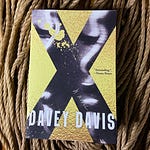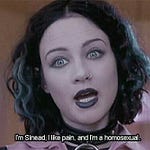The following is my speech for indoctrination into my cult, so let me know if you want in :)
I’ve written about imagination several times before as it relates to queerness, leather, and gender. In being forced off the hamster wheel of overly busy New York City life, I’ve been thinking a ton more intentionally about imagination. Adults notoriously suck at imagination. Year after year the grind of capitalism and sober reality chips away at innocence and wonder. Imagining is a trait relegated to children— playing pretend and dreaming and fantasizing is for those who haven’t yet been exposed to how the world actually works. The adults of the world even use this knowledge to control children with lies about Santa Claus, or even with threats of the Boogeyman if you also had a sadist for a father. Growing up means orienting yourself within the confines of what’s narrowly defined (the more oppression one faces, the narrower this becomes) as acceptable for being a human. This is not news.
This narrow definition of a compliant human produces a lot of anxiety for people to want to fit in— fitting in means belonging, it means being Good, and it means being loved. This is how most parents raise their kids. This not only stops us from living our truth, it also introduces the shit storm of self-doubt, not measuring up, the deeply fucked up idea of perfection, impossible standards, etc. In some extreme cases the shame of imperfection can take control of people’s lives.
I started reading Radical Acceptance by Tara Brach. Kala has talked about how great this book is for a few years now so I figured it was time to read it. What I thought was going to be a self-help book for people to learn how to stop being their own worst enemy is actually inspiration porn for welcoming an adult imagination. This makes a lot of sense— if your doubts and fears are limiting or even running your life, you can’t begin to dream about alternatives. The book is based on Buddhist philosophy so it has lots of beautiful language on hope and the possibility of living fully when we stop battling ourselves. I love reading things that spark my little lightbulb and put me in deeper conversation with other ideas or theories. I haven’t finished this book yet, but I have already drawn a bunch of lines on my chalk board to connect it to other things I’ve been thinking about.
My brain is ruled by logic, I am deeply fortunate in this way that I can almost robotically rationalize my hard emotions until they simply disappear (why I put off reading Radical Acceptance for so long). This is a double edged sword because while I very rarely get bogged down by anxiety or self-doubt, it also means that I have a harder time relating to people. I’ve been able to get over breakups very quickly by telling myself I’m better off. I’ve been able to easily cut family out of my life just by listing the “bad” things they’ve done. Understanding that having feelings wasn’t conducive to me surviving my childhood, emotional intelligence is a skill I have had to consciously develop as an adult by trying hard to not be a cold hearted bitch. Even the shame that I felt in being “broken” (read: internalizing the projections of extremely emotional people) I easily rationalized away.
The contradiction here in treating my emotions clinically is that I’m also excellent at imagining. I think it’s because my imagination isn’t stifled by the confines of what would make me “good” in our society. Many of the limits or roadblocks that people come up against internally don’t even cross my mind because I dismiss respectability with my gift of logic. Asking “Why can’t I do this?” is giving myself permission to dream bigger. Why can’t I have five girlfriends? Why can’t I be a Daddy? Why can’t I be naked on the internet? Maybe my stunted emotional range just doesn’t include shame, which is wild considering my Catholic upbringing.
In Radical Acceptance, Brach talks about the etymology of the word radical. As is customary for my newsletters and my logic brain, I often look up words to learn what the roots are. There’s something funny about looking up a word’s root to find out that it literally means root, or the Latin word radix if you’re nasty. When we say something is “radical” —this term has been co-opted so please know that I mean actually radical not radfem or police reform radical—we mean it’s been processed through a dissection at the root. The first uses of the word were in reference to tree roots. How beautiful is that? Radical ideas get at the root, go all the way to the origin and dissect the issues. When I learn another instance of racism rotting at our country’s core, it’s easy to jump to the only logical solution “We must abolish America.” Imagining something better than **this** is not hard for me.
There are so many bad and incorrect stereotypes of anarchism like it’s just burning shit down, being lawless, no regard for human life, it’s only for privileged white kids, etc. Historically, when a way of thinking or being is a threat to those in power, they retaliate by stamping out the opposition. Just last week The DOJ named New York City, Portland, and Seattle anarchist jurisdiction zones, meaning the governments in these cities are responsible for permitting anarchy to thrive thus proving that they have no idea what anarchy actually means. These people think very basic protesting is anarchism, and anarchism is like The Purge. Honestly, not even fucking close!
Having an imagination for the possibilities of human relation outside of the status quo is a threat to the status quo. The strength of the terrible two party system is shaped by stifling all imagination for an alternative. The mainstream definition of sex is enforced by delegitimizing queer existence. The nuclear family is strengthened by the laws that privilege those who conform over those who imagine different types of kin. The prison industrial complex exists because we lack the creativity necessary to conjure a world where we don’t lock people away. Prison abolitionist Mariame Kaba writes that “It’s not simply that we can’t imagine a world without police, but that we are disciplined into not having that imagination.” Radical means that when you dissect something all the way to the root, you’re able to recognize when it simply needs to be tossed in the garbage. Radical is pushing beyond the anxieties of being good and belonging to dream up the world you would have wanted to live in as a child with an unbridled imagination.
I love math (shocking!) and radical expressions in mathematics are used to find the nth root of a number or equation. Equations have one solution, in order to really solve them you have to think through each step of the problem. Quitting a problem halfway and saying “welp that’s enough for me” is the mathematical metaphor for liberalism. Thinking about how all these issues of oppression and injustice are connected often makes me feel like I’m doing math. Breaking all the shit down to find the root means we are mathematicians. The square root of one problem exposes yet another problem and all of their roots are connected.

For me, queerness has always been uniquely characterized by a sense of imagination. Thinking about questions we get from clueless straight people like “Who’s the man in your relationship?” proves the absence of imagination. To embody queerness is to color outside the lines, create new lines, hold up your beautiful piece of art and say, “She’s absolutely perfect!” Even the most mainstream parts of our culture, like drag, really exemplify the inherent camp, whimsy, and creativity of queerness. Straight people love drag, and maybe it’s because it is a projection of their longing for other ways of being. We constantly create new paths for existing that make us feel whole, and for the most part our own queer culture validates this. I cannot comprehend queerness that stays inside the lines. When I do the math on my chalkboard, I find myself drawing connections from queerness to abolition, to leathersex, to anarchism, to polyamory, etc. These are ways of orienting that rely on finding the square root of the problem and using our wildest imaginations to begin building a better world.
I am a huge fangirl for Dr. Kim Tallbear, one might even say I’m a stan. If you’re unfamiliar, she is an Indigenous academic and polyamorist who connects really cool dots between settler colonialism, sexuality, and ideas of kinship. In other words, deeply my shit. I recently listened to an episode of the For The Wild podcast where she was the guest. In the podcast she reads one of her “Critical Poly 100s,” short creative writing pieces about polyamory, where she uses the phrase “future hoarding.” I absolutely cannot stop thinking about this idea of future hoarding!
To put this into context we can think about a traditional monogamous relationship. The relationship escalator has two people dating, moving in together, getting engaged, getting a dog, getting married, having kids, dying together never having had sex with anyone else ever again. Future hoarding is exactly what happens here, your future is planned and you essentially own the rights to the movie of your partner’s mortal life. Dr. Tallbear also drops a spicy take that I absolutely agree with and distinguishes between different kinds of polyamory. There’s the mainstream version of polyamory that functions a lot like what she calls “monogamy on steroids” where future hoarding is still an active part. It does nothing to dismantle The Couple. Then, there are ways of practicing polyamory that don’t involve future hoarding at all. These are expansive concepts of being in “good relation” to other living things that encompass our relationships with animals and with the earth. Dr. Tallbear explains that this type of polyamory is closer to how many Indigenous peoples had relations before settler colonialism, as stolen land was rationed back to Native Americans in the Dawes Act by forcing assimilation through patriarchal Christian marriages.
When we grow up, dull our imaginations, and behave exactly how society wants, this is also future hoarding. Playing within the scripts of what makes us good and worthy and performing the Perfect Human means we allow most of our life decisions to be made for us. Living in fear or shame is future hoarding in that we only live to please others, and in living to please others we lose ourselves and the ability to imagine any other way.
When I think of the mathematics of Bad Things, future hoarding is like a variable in the equation. The prison industrial complex is quite literally future hoarding, a lack of universal healthcare is future hoarding, transphobia is future hoarding, voting for the next terrible president to save us is future hoarding. Finding ways to cultivate my imagination not only benefits me, but it benefits my community. Dreaming up ways that bring us closer to freedom puts us in better relation with ourselves and with other living things. Tara Brach says that imperfection is not a personal problem, and I think that failing at finding better ways of belonging is better than never even trying.














Share this post